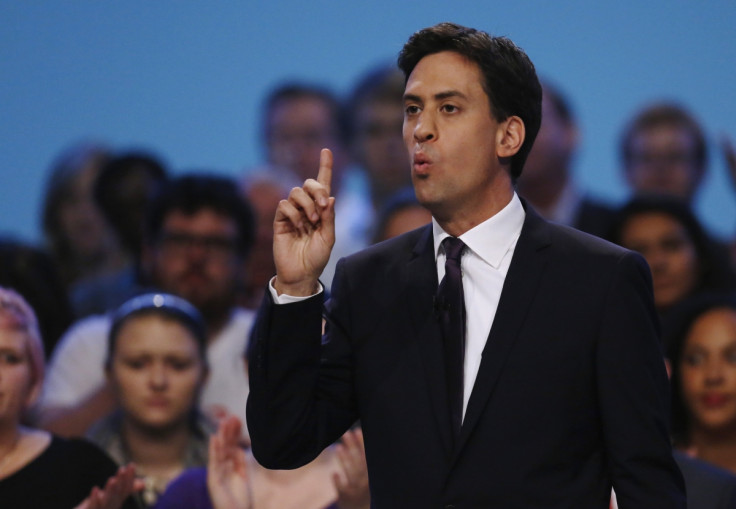Ed Miliband Offers Labour Vision and Sets Banks Challenge to Tory David Cameron

Labour leader Ed Miliband has used his much-anticipated speech announcing plans to break up Britain's big banks as an attempt to kick some fresh momentum into his previously successful cost-of-living-crisis agenda which has recently been losing some of its power.
In his first major campaigning speech since his agenda-setting conference performance last September, he presented David Cameron with a new challenge of matching Labour's approach to banking reform and people's standards of living.
But there was a much wider message in his note-free speech which was largely summed up by the phrase: "Deficit reduction alone is not a vision for the country".
He attempted to meet head-on the Tory strategy of relying on sustained economic recovery by suggesting it would be of little help to ordinary working people who would not feel the benefits which would largely go to the wealthy.
He outlined Labour's strategy of persisting with the cost of living crisis attack, which many believe was starting to run out of steam, but which he repeated was "the biggest challenge our country faces".
"The government say things are going to be OK because of the (economic) forecasts," he said. "If they really believe a few months of better statistics are going to solve the cost of living crisis, that only goes to show they have absolutely no clue about the scale of the problem or the scale of the solution required."
We need a reckoning with our banks, not for retribution but for reform.
That section of the speech showed Miliband clearly hoping to move the political debate away from simply economic recovery and onto more fertile Labour territory over which sections of society would benefit from the recovery. And he has already identified the often-ignored, struggling middle classes as a key group.
In an echo of his hugely-popular pledge to freeze energy prices, he offered his radical proposals for banking reform as the latest example of how a Labour government would change the way Britain was run, ensuring the banks served the people rather than the opposite.
While this was a big, themed speech, it also did what Miliband did before with his energy price freeze - to hit a popular nerve and challenge the government to match it or appear to be standing up for the powerful and wealthy.
If past behaviour is anything to go by, Cameron and Chancellor George Osborne may well attempt to neutralise what has all the hallmarks of another populist policy.
It happened over the energy price freeze which David Cameron ridiculed but then moved to match by removing all green levies from consumers bills in a bid to reduce them.
Then, after repeatedly rejecting Labour's attempts to price fix, Cameron ordered a freeze on some rail fares and later announced a cap on the overall cost of payday loans after Miliband targeted the "Wonga culture".
And on the eve of Miliband's speech, and only days after Osborne warned against "self-defeating" increases in the minimum wage, the Chancellor suggested it should rise to £7 an hour.
For a minister routinely claimed to be the most formidable political strategist, this last shocked some in his own party, and many in industry, who saw it as a purely tactical attempt to overshadow Miliband's keynote speech on the big banks.
In the end it is unlikely to have succeeded in knocking Miliband off the headlines as the Labour leader's speech was a much deeper statement of his overall vision that just a simple policy announcement.
Miliband has had a dangerously quiet start to the year during which the economic recovery boosted the government's poll ratings and pushed him onto the back foot. This speech was aimed at regaining the momentum he has lost while landing the Tories with a fresh policy challenge.
© Copyright IBTimes 2025. All rights reserved.






















